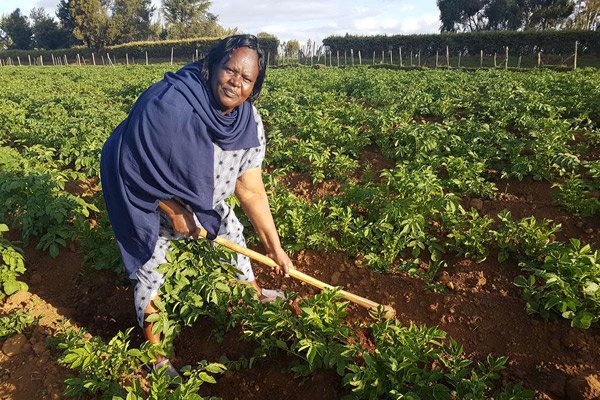BY RACHEL KIBUI
Ann Mbugua specialises in seed potato production, a venture she got into in 2005.
She says she used to practice small-scale potato farming until she was invited for a training on seed production in Limuru organized by Kenya Plant Health Inspectorate Services (Kephis) and Kenya Agricultural and Livestock Research Organisation (Karlo).
The training was triggered by a looming potato seeds shortage in the country and the organisations were trying to convince farmers to think beyond table potato production and instead take advantage of the marketable, higher paying seeds.
“Immediately after the training, I asked my husband to send me Sh3,000 which I spent on buying two 50kg bags of seed potatoes,” she says.
At the moment, Ann has 25 acres of potatoes all targeted to be harvested as seeds in the next three weeks.
From each acre, she harvests about 120 to 150 50kg bags of seeds each fetching Sh2,500. If she was to farm mature potatoes, Ann approximates that she would harvest between 50-80 bags from the same size of land, each of which she would sell at between Sh1,800-Sh2,500 depending on demand and supply.
“Seed potato has a stable market price as most farmers specialise on traditional potato-for-consumption production,” she says.
Ann is a certified Shangi seeds potato producer.
“I sometimes leave land idle to be able to produce very clean certified seeds. In other cases, I practice crop rotation and plant peas or beans to fix nitrogen in the soil,” she explains
Once you have tilled the land, the second step is ridging. A farmer should space one foot from crop to crop, and about two and a half feet from one ridge to the other. While planting. DAP application is advisable to boost the crop’s strength right at the beginning.
After 18-21 days the crop germinates, and the first application of herbicide is important in order to block weeds from competing with the potato crop.
It is also important to spray the crop against earthworms as they are common and very destructive. The farmer then digs up his crop while plants are at about 20cm tall.
While mature potatoes take about 120 days to mature, seeds are ready for harvesting at between 75 – 90 days after planting. The best quality seeds, according to Ann, are the size of an egg.
She then spreads them in a dark store for about three days, to allow them adopt to the new environment and heal from any injuries, a time referred to as “curing period”.
However, some clients insist on buying as soon as the seeds are harvested.
During the process, Kephis officials actively monitor the crop and visits the farm at least thrice especially during the flowering stage when they can easily and accurately identify the variety.
In total, Ann spends about Sh35,000 paying Kephis to monitor her crop at the farm .
The seeds are then packaged and ready for sale.
To keep diseases at bay, Ann ensures that all employees do not bring farm tools from outside. And although she would make a kill by hiring out her tractor, she uses it exclusively within her farms.
“I would rather earn from the seeds than get income from hiring machinery and risk infecting my soil,” she says.









